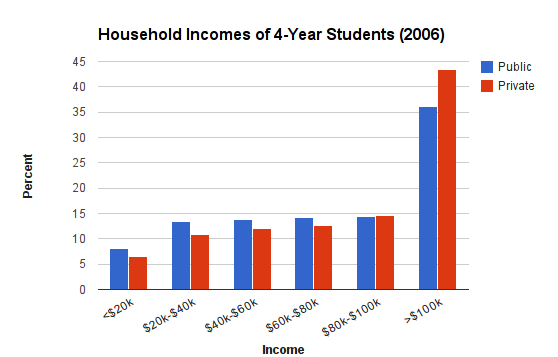I had a post today about higher education. The aftermath has been interesting. Most seem to have conceded (with only Aaron Bady holding out that maybe the College Board’s summary of NPSAS data is not accurate) that the spike in college costs have fallen primarily on non-poor kids, the richest half of kids especially.
What they are quibbling with instead is my claim that the class composition of college is substantially skewed upwards in the income distribution. I have two bits of data on this. The first is the Bailey-Dynarski figures, from which I have three graphs in the initial post. These are useful figures because they provide the only comparable historical figures that I am aware of, especially figures from longitudinal data. But one issue is that the figures combine public and private four-year colleges together.
So to supplement that, I later linked to NPSAS data that shows the similarity in the class composition of public and private four-year colleges. There are differences, but I’d stand by the description that they are substantially similar.

So now the private/public thing is hopefully dealt with reasonably well. But then a new objection is raised. This only includes dependent students. What about independent students? Independent students make up just over 26 percent of the student bodies of both private and public four-year universities.
The criticism of the non-inclusion of independent students spanned from just open curiosity to the view that I have intentionally left out data that is supposed to harm me. But the reality here is that the reported incomes of independent students are not comparable to the reported incomes of dependent students, and the reported incomes of independent students do not tell you anything about their family background. This is not a judgment call I have uniquely made. The NPSAS table I draw them from makes the exact same judgment call. If you were to combine independent and dependent students together, you would be smashing together totally incomparable income figures (apples and oranges if you will). The incomes of independent students are their personal incomes, while the incomes of dependent students are their parents’ incomes.
So now the independent students are the last great hope. Maybe that’s where all the poor kids are hiding out. I don’t know if they are or aren’t. You can speculate in all sorts of directions what their family’s background is.
For instance, here is somewhere my brain goes. Getting into a private (or public) four-year is not like something you just sign up and do. You have to take college entrance exams, you have to get together transcripts, do the arduous applications, and do it on particular time schedules. It seems like something poor kids who are graduated and out working some presumably pretty horrible jobs will not have an easy time doing. In fact, the difficulty of handling the whole admissions dance is one of the reasons given for why private for-profits have done so well among poor, non-traditional students.
But more broadly, I find this whole line of push back utterly bizarre. I write day after day about how being poor really is a horrible way to live, especially if you are a kid. It literally messes you up, not unlike lead exposure does. Folks cheer that on happily. Of course, poverty is harming kids and their ability to learn and develop and flourish, they exclaim.
But when you keep talking and say “so yeah that also means they are surely under-represented in selective educational institutions”, people go “I don’t know about that! How can you be sure?!” I just really can’t believe people would find that anything but wildly obvious, only to be discharged by the most confounding of counter-intuitive findings to the contrary.
I am not trying to hide any balls here. I didn’t realize it was so contentious for people who accept that poverty is horrible for children to also accept that the horribleness almost certainly bleeds over in competitions for selective college seats.
I do wonder though if all the poor kids are hiding out in the independent students category whether that also then turns back on the claim that poverty is holding kids back? Maybe we do have equal opportunity after all? Shrug.